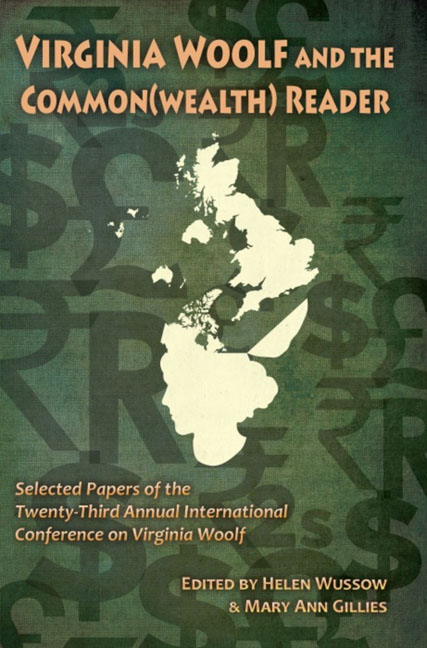Book contents
- Frontmatter
- Contents
- Introduction to Virginia Woolf and the Common(wealth) Reader
- Acknowledgments
- List of Abbreviations
- Invocations
- Networks of Affiliation: Foundations and Friends
- Woolf and the Commonwealth
- “Simplicity and art shades reign supreme”: Costume, Collectibles, and Aspiration in Katherine Mansfield's New Zealand
- Wealth in Common: Gifts, Desire, and Colonial Commodities in Woolf and Mansfield
- On a View from the Rims: Katherine Mansfield and Emily Carr
- London Calling: Una Marson in the Colonial London Scene
- Modernism Across the Commonwealth: Virginia Woolf's and Arundhati Roy's Critique of Empire
- From Bloomsbury to Fountain Lakes: An Australian Virginia Woolf
- 1930s Onwards
- Woolf Beyond the Book
- Notes on Contributors
- Conference Program
On a View from the Rims: Katherine Mansfield and Emily Carr
from Woolf and the Commonwealth
- Frontmatter
- Contents
- Introduction to Virginia Woolf and the Common(wealth) Reader
- Acknowledgments
- List of Abbreviations
- Invocations
- Networks of Affiliation: Foundations and Friends
- Woolf and the Commonwealth
- “Simplicity and art shades reign supreme”: Costume, Collectibles, and Aspiration in Katherine Mansfield's New Zealand
- Wealth in Common: Gifts, Desire, and Colonial Commodities in Woolf and Mansfield
- On a View from the Rims: Katherine Mansfield and Emily Carr
- London Calling: Una Marson in the Colonial London Scene
- Modernism Across the Commonwealth: Virginia Woolf's and Arundhati Roy's Critique of Empire
- From Bloomsbury to Fountain Lakes: An Australian Virginia Woolf
- 1930s Onwards
- Woolf Beyond the Book
- Notes on Contributors
- Conference Program
Summary
When Helen Wussow approached me about giving this talk, she suggested that in light of the conference theme, I might want to use it as an opportunity to extend the work I had done on Emily Carr and Katherine Mansfield in Pacific Rim Modernisms. Initially, I had in mind a paper that would build directly on the arguments we put forth in Pacific Rim Modernisms —that the “seismic intensity of cultural activity that took place in and through the [ring of fire—as the Asia Pacific rim is sometimes called] during the modernist period”(xi) has not received the same quality, or quantity, of critical engagement as Trans Atlantic modernism has. My first thought was to look at the ways in which the concept of Commonwealth—both as a collection of former British colonies and as “wealth of commonalities” shared by writers and artists of the modernist period—functioned in Carr and Mansfield and how that connected them to Woolf. It is certainly the sort of paper that would meet the mandate I was given and perhaps even the paper Helen anticipated I would give when she invited me to speak at this conference.
However, over the last few years, my work has been drawn back to questions that first piqued my interest over thirty years ago when, as an undergraduate, I encountered Henri Bergson's work. Time, memory, aesthetics and, especially, consciousness all have reemerged as significant questions, though as my understanding of them has deepened over the years, I now find myself asking different questions and discovering different answers. At the same time, my readings in the rapidly evolving field of neurosciences—particularly in the area of embodied forms of perception and cognition and how they relate to art and aesthetics—complicated the philosophical approach to these issues, though I will say that Bergson still has much to offer to those debates. Given that my reading, thinking and writing have been much more focused on these issues, it was not surprising that when I started to work on this paper that I was pulled away from my original focus on Trans Pacific modernisms towards a paper that would look at some of my current concerns.
- Type
- Chapter
- Information
- Virginia Woolf and the Common(wealth) Reader , pp. 94 - 106Publisher: Liverpool University PressPrint publication year: 2014



